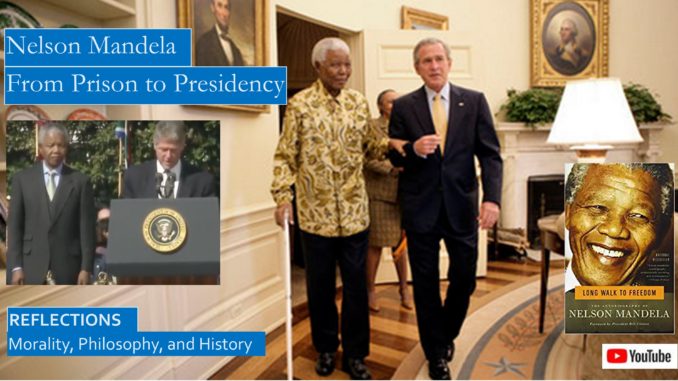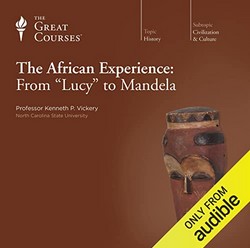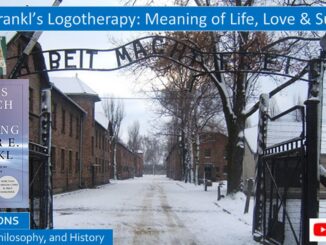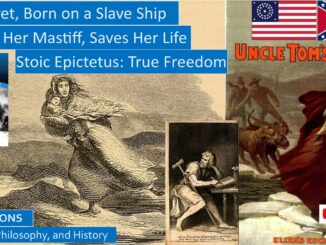
One day the prison guards marched into his cell and told Mandela to pack up his things, he was going to be transferred with the other top ANC leaders. His new home would be Pollsmoor Maximum Security prison in Cape town. “Pollsmoor had a modern face but a primitive heart. The buildings, particularly the ones for the prison staff, were clean and contemporary, but the housing for the prisoners was archaic and dirty.”
Blog 1 of this series: http://www.seekingvirtueandwisdom.com/nelson-mandela-blog-1-a-childhood-in-transition/
Blog 2 of this series: http://www.seekingvirtueandwisdom.com/mandela-as-a-reluctant-revolutionary-blog-2/
Blog 3 of this series: http://www.seekingvirtueandwisdom.com/mandela-decades-spent-in-prison/
Please see our YouTube video, with many photos, at: https://youtu.be/X3UnZYeE_kA
But Mandela and the other ANC leaders would have better accommodations, they had the entire third floor to themselves, they each had their own bathrooms, their own showers, and beds and sheets and towels! They could feast on three meals a day of meat and vegetables. They could read many magazines without the censors cutting out forbidden news. They even had their own spacious outdoor terrace, although they could not see through the twelve-foot walls. When his wife Winnie visited he could actually see her through a large pane of glass, and when the visiting time was over the guard would not back “Time up!” Instead he would politely say, “Mrs. Mandela, you have five more minutes.”
This chapter Mandela titles “Talking with the enemy.” Indeed, the ruling National Party was starting to realize that majority rule was inevitable. They were coming under increasing political and financial pressure, new sanctions were imposed by the UN, US, and other countries, more companies closed their operations in South Africa, banks and investors decreased their holdings in the country, ANC acts of sabotage increased, protests and riots and bloodshed on both sides kept increasing, the days of apartheid were numbered.
In Parliament President Botha publicly offered Mandela his freedom if he would “unconditionally reject violence as a political instrument.” Mandela was permitted an extended visit with Winnie to discuss his response. His daughter Zindzi read his statement at a public rally at Soweto’s Jabulani Stadium, “Let Botha renounce violence. Let him say he will dismantle apartheid. Let him reverse the ban on the people’s organization, the African National Congress.”
A few pages after this speech Mandela writes “both sides regarded discussions as a sign of weakness and betrayal.” But the goal of the ANC all along was to force the government to the negotiating table. Mandela thought the time had come to make the first step. He sent a simple letter to General Willemse, commissioner of prisons, that he needed to see him on a letter of national importance. He was taken to the general’s residence, and told him he wanted to meet with Kobie Coetsee, the minister of justice. When asked why, he simply said, “I want to see the minister in order to raise the question of talks between the government and the ANC.” The minister happened to be in town, so they visited Coetsee at his residence, and he said he would see if he could arrange a meeting with Botha.
But you just cannot jump into a serious relationship all of a sudden, some dating had to happen first. “Lieutenant Colonel Gawie Max, deputy commander of Pollsmoor, wandered by his cell after breakfast and said quite casually, ‘Mandela, would you like to see the city?’” Mandela was a little perplexed, but then he said to himself, Okay, why not? They walk out the fifteen locked metal doors of the prison and then they get into his waiting car and drive aimlessly down a lovely road on the coast of Cape Town. He stops to get a soda leaving his prisoner in the car with the engine running.
Mandela remembers, “it was absolutely riveting to watch the simple activities of people out in the world, old men sitting in the sun, women doing their shopping, people walking their dogs. It is precisely those mundane activities of life that one misses most in prison. I felt like a curious tourist in a strange and remarkable land.” There were more trips out on the town. One warder “actually took me to his family’s flat and introduced me to his wife and children. From then on, I sent his children Christmas cards every year.”
Then one evening the warder came to his cell and told him to pack his things. Another transfer. You will know where when you get there.
They drive to the grounds of another prison in a suburb of Cape Town. Mandela recalls, “we drove to the end of a rather wild, wooded area at the rear of the prison grounds. We came to an isolated, whitewashed one-story cottage set behind a concrete wall and shaded by tall fir trees,” a cottage all to himself, a cottage with a kitchen and a swimming pool and several bedrooms. Mandela was assigned an Afrikaner cook, Mr. Swart, so he could adequately entertain his ANC comrades and other guests! Mandela had to insist the he would wash the dishes and make his bed, not his Afrikaner cook.
Mr. Swart and Nelson became great friends, Mr. Swart had met him when he was a warder from Robben Island. Some guards were better, some were worse, but even in the worst situations Mandela commanded respect and never lost his personal dignity. Nelson and Mr. Swart compromised on which language they would use, Mr. Swart could speak to him in English, and Mandela could answer in Afrikaans, so both could practice the language in which they were the weakest. He would disarm his Boer opponents by speaking to them in fluent Dutch Afrikaans. The Dutch Boers had settled South Africa several hundred years before, and Mandela was more familiar with the white Afrikaner history better than many Boers. He would very patiently retell the history of his ANC movement, comparing the struggle the blacks experienced resisting apartheid to the struggles the Boers endured to gain independence from the English. Mandela always tried to see the world through the eyes of his opponents, so he could find common ground for mutual understanding.
Before a meeting with Botha could be arranged some preliminary talks were needed. The first issue was that the government “insisted the ANC must renounce violence and give up the armed struggle before the government would agree to negotiations.” Mandela responded that “it is always the oppressor, not the oppressed, who dictates the form of the struggle. If the oppressor uses violence, the oppressed have no alternative but to respond violently.”
Coetsee observed that the National Party had stated repeatedly that it would not negotiate with any organization that advocated violence, politically, what else could they do? Mandela responded, “Gentlemen, it is not my job to resolve your dilemma for you.” Mandela had a good feel for when he would be conciliatory, when he should compromise, and when he should stand firm and resolute.
The second issue was the relationship between the ANC and the Communist Party. Mandela said that the Communist Party did not control the ANC, that the ANC did not believe in the communist ideology, but that he would not disavow the assistance the Communist Party had provided over the years.
The third issue was whether the rights of the minorities, in particular the white minority, would be guaranteed under majority rule. Mandela’s response was that “whites were Africans as well as blacks, and that in any future dispensation the majority would need the minority. We do not want to drive the whites into the sea.”
Shortly before he was released Mandela got his meeting with Botha. Mandela was provided a suit and was smuggled into the Presidential Office. Botha staged a welcoming walk where they met in the middle of a grand hall, shook hands, had their official picture taken, and then chatted in his office over tea about South African history. Botha’s health was failing, he would soon resign. FW de Clerk would succeed him, and the book doesn’t speculate, but perhaps the meeting was set up to Botha would be one to cross the Rubicon, so that de Clerk would not be the first South African President to meet face to face with Nelson Mandela.
The roads were so crowded with singing, dancing, jubilant Africans the day Mandela was released that his motorcade arrived at the Cape Town City Hall for the planned celebrations. Mandela remembers his surprise “when a television crew thrust a long, dark, furry object at me. I recoiled slightly, wondering if it was some newfangled weapon developed while I was in prison. Winnie informed me that it was a microphone.”
Negotiations began to plan for the elections to a national assembly that would write a new constitution and form a new majority government. Now that he was out of prison and real negotiations were proceeding, the violence escalated, there were several incidents where the police looked the other way while their Zulu opponents massacred ANC supporters. Mandela had to walk the fine line between firmness and compromise to bring the country to the ballot box.
After some debate, and with Mandela’s urging, the ANC declared that it would suspend its armed struggle, with the understanding that armed struggle could resume if the government showed bad faith.
There was tension between the ANC and the ruling National Party. Mandela and the ANC thought that the government was trying to negotiate a power sharing arrangement that was little more than watered-down apartheid. But the ANC realized they could not effectively govern if the current civil servants running the government fled after the elections. In the end, they agreed for the first five years that every major party would be represented in the cabinet, and that after that there would be simple majority rule.
The National Party lost an important by-election a more right wing party, so de Klerk scheduled a referendum so the white people of South Africa voted on whether they supported the reform process that would lead to a new constitution through negotiation, the vote was 69% in favor, giving de Klerk a great victory.
The campaign began. The Zulu Inkatha party and the right wing Conservative Party did not meet the party registration deadline, Mandela enticed them to participate in the election. The ANC had an ambitious platform, which was only partially fulfilled upon election, which included “creating jobs through public works, building a million new homes with electricity and flush toilets, to extend primary health care and public education for all, to redistribute land through a land claims court, and to the VAT tax on basic foodstuffs.”
Often Mandela told crowds, “do not expect to be driving a Mercedes the day after the election or be swimming in your own backyard swimming pool. Life will not change dramatically, except that your self-esteem will increase and you will become a citizen in your own land. You must have patience. You might have to wait five years for results to show.”
The ANC won the election with 63% of the vote. Mandela was happy that the ANC did not gain the two-thirds needed to draft the constitution without input from the other parties. He did not want an ANC constitution, he wanted a South African constitution.
In the closing pages of his autobiography Mandela shares some comforting thoughts, “No one is born hating another person because of the color of his skin, or his background, or his religion. People must learn to hate, and if they can learn to hate, they can be taught to love, for love comes more naturally to the human heart. Even in the grimmest times in prison, when my comrades and I were pushed to our limits, I would see a glimmer of humanity in one of the guards, perhaps just for a second, but it was enough to reassure me and keep me going. Man’s goodness is a flame that can be hidden but never extinguished.”
Mandela is ever the stoic, “A man who takes away another man’s freedom is a prisoner of hatred, he is locked behind the bars of prejudice and narrow-mindedness. I am not truly free if I am taking away someone else’s freedom, just as surely as I am not free when my freedom is taken from me. The oppressed and the oppressor alike are robbed of their humanity.”[1]
[1] Nelson Mandela, “Long Walk To Freedom, an Autobiography,” (New York: Little Brown and Company, 1994), pp. 509-625






2 Trackbacks / Pingbacks